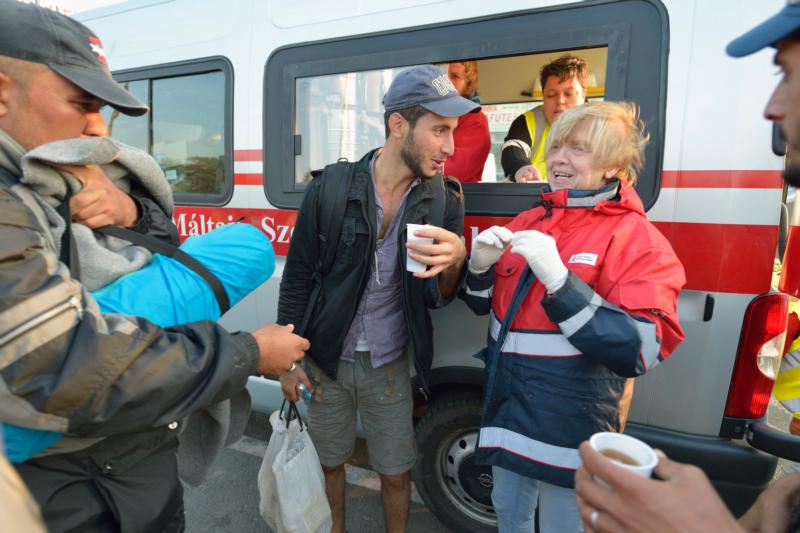
Hungarian volunteers share conversation, Sept. 24, as they give coffee to refugees passing through Hegyeshalom, Hungary, on the way to Austria. (CNS photo/Paul Jeffrey)
by Catholic News Service
HEGYESHALOM, Hungary (CNS) — Along the border between Hungary and Austria, Rosala Holzschuh stands in the midnight darkness as thousands of refugees flow past her on their way toward Western Europe. As a cold wind swirls around her, Holzschuh looks for children with no shoes, and when she spots one, she grabs their parent and steers them toward a pile of donated socks and shoes.
As Europe faces its largest refugee crisis in decades, government agencies and charitable groups simply cannot fill the enormous humanitarian gaps. Holzschuh, a Catholic from Vienna, is one of tens of thousands of volunteers spread across several countries, shepherding the multitude of refugees and migrants crossing their lands.
“The children are freezing, and they arrive here after hours on the train with no food or water. So we need to help. I found a group asking for volunteers on Facebook, and so I come here and prepare sandwiches and try to give the refugees a warm welcome,” she said.
The president of the Hungarian bishops’ conference said such volunteers have played a critical role in responding to the current crisis.
“I have been to the borders, to the front lines of this crisis, and I’ve been amazed at the number of volunteers who have gone there to assist the refugees,” said Bishop Andras Veres of Szombathely.
He said that while Caritas Hungary was responding as best it could to the government’s invitation to assist those traveling through the country, it was the volunteers who made any meaningful response possible.
“Christians in Hungary have been very eager to assist the refugees, providing them with food and shelter,” he said. “There has been a wave of solidarity to match the wave of refugees.”
Visiting Greece in mid-October, the head of Caritas Internationalis, Philippine Cardinal Luis Antonio Tagle of Manila, also praised the volunteers and said they illustrated the meaning of caritas, or love.
“Caritas is Caritas because of those simple people who give of themselves,” the cardinal said.
Elizabeth Hawn is a Catholic from Budapest, Hungary, who volunteers with Malteser International, a Catholic organization, to provide hospitality to refugees at Hegyeshalom.
“We are here because we have a mission to help people who need help. We are Christians, so we are here where we’re needed,” she said.
Lilly Kolarec is a Croatian Catholic from the village of Bapska, near her country’s border with Serbia. She spends all the time she can at the nearby border crossing.
“Led by our priest, the whole village has been helping since the beginning, since before all the aid groups showed up. We made tea for the refugees and provided diapers for their children. We did whatever we could to help them,” she said. “And we’ll keep on doing that as long as we’re needed.”
Kolarec said Croatians see themselves in the strangers from Syria and other war-torn countries.
“We’re very sympathetic. We have, ourselves, experienced war and what it’s like to be a refugee. That’s why so many of us are volunteering,” she said.
In some cases, volunteers have not had to seek out refugees. On the Greek island of Samos, thousands of refugees have disembarked from the flimsy boats in which they arrive from Turkey and spent five hours climbing a steep hillside to the Zoodochos Pigi monastery, where 15 Orthodox nuns have had to attend to a crowd of weary families at their door.
“We give them water and bread, and we call the police to come pick them up,” said Sister Evniki, the monastery’s mother superior. “But sometimes the authorities are so overwhelmed with the number of refugees landing here that they cannot come, so we tell the refugees how to walk to town.”
Sister Evniki said she learned from the refugees that they have been instructed by the traffickers who provided the boats that they should seek assistance at the monastery.
“One man showed me Google Maps on his mobile phone, and the traffickers had marked our monastery as they place where they should seek help,” she said.
The refugees have disrupted the normally tranquil life of the nuns. The monastery’s limited water supply has run out at times, overtaxed by the thirsty immigrants. Trash has piled up where the refugees wait, and while some tourists arriving to visit the picturesque monastery have shared their own food and water with the refugees, other take one look at the refugees and leave. For a monastery that depends on selling embroidery and painted icons to visitors, that’s a problem.
Yet no matter the hardship, Sister Evniki says the nuns will continue to respond with compassion.
“We believe that in each person we see the face of Jesus Christ, and we have to help them,” she said.






